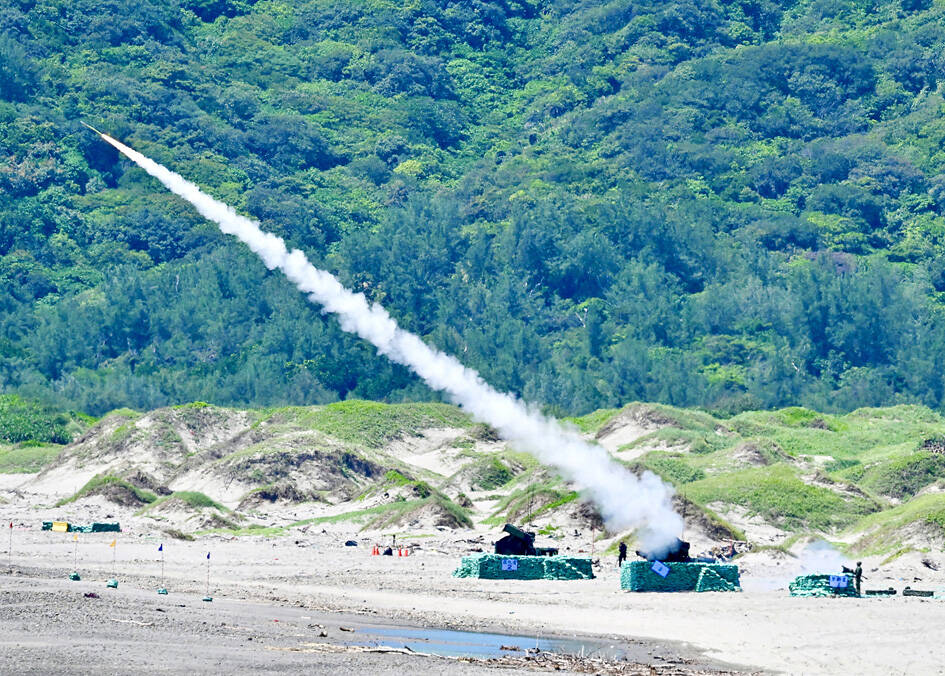Part of a package of man-portable air-defense (MANPAD) Stinger missile systems was delivered to Taiwan last year, sources familiar with the issue said yesterday.
Capital defense units, such as the Military Police, the Marine Corps and the army’s special forces units, were prioritized to receive the weapons, which were authorized by the US’ National Defense Authorization Act (NDAA) to boost Taiwan’s self-defense capabilities, the sources said.
The NDAA for the last fiscal year included provisions to provide US$10 billion in grants — US$2 billion over the next five years — for Taiwan to buy US-made weapons.

Photo: Lo Pei-te, Taipei Times
The NDAA also paved the way for 1,000 M240B machine guns, 8,000 sets of combat gear, tethered aerostat radar systems and coastal surface-to-air Harpoon missile systems, the sources said.
While news media have reported that Washington might provide Taiwan with four MQ-9A Reaper drones, the drones need to be paired with real-time ground stations to be 100 percent functional, the sources added.
The M240B guns have a broader range of uses, including on helicopters, combat vehicles, tanks and small boats, they said, adding that Taiwan procured the weapon for use across the military and for the Coast Guard Administration.
The navy has budgeted NT$13.37 billion (US$427.94 million) to purchase 500 additional Stinger missiles, half of which would go to the army and the other half to the Marine Corps or naval vessels, the sources said.
The second batch is expected to be delivered later this year, they said.
A Ministry of National Defense budget showed that Army Command Headquarters has set aside NT$7.26 billion, covering 2019 to next year, for 250 Stinger missiles, 108 gripstock-control groups — which attach to a shoulder-fired guided missile launch tube — and 108 Identification Friend or Foe (IFF) transponders.
Navy Command Headquarters has allotted NT$6.19 billion from 2017 to next year for 250 Stinger missiles, 70 gripstock-control groups and 62 IFF systems.
Department of Strategic Planning director Lee Shih-chiang (李世強) in October last year said that the grip controls for the MANPADs are capable of loading Avenger missiles and missiles used for dual-mounted Stinger systems.
The army ordered the extra grip controls for tactical flexibility, Lee said.

CHAOS: Iranians took to the streets playing celebratory music after reports of Khamenei’s death on Saturday, while mourners also gathered in Tehran yesterday Iranian Supreme Leader Ayatollah Ali Khamenei was killed in a major attack on Iran launched by Israel and the US, throwing the future of the Islamic republic into doubt and raising the risk of regional instability. Iranian state television and the state-run IRNA news agency announced the 86-year-old’s death early yesterday. US President Donald Trump said it gave Iranians their “greatest chance” to “take back” their country. The announcements came after a joint US and Israeli aerial bombardment that targeted Iranian military and governmental sites. Trump said the “heavy and pinpoint bombing” would continue through the week or as long

TRUST: The KMT said it respected the US’ timing and considerations, and hoped it would continue to honor its commitments to helping Taiwan bolster its defenses and deterrence US President Donald Trump is delaying a multibillion-dollar arms sale to Taiwan to ensure his visit to Beijing is successful, a New York Times report said. The weapons sales package has stalled in the US Department of State, the report said, citing US officials it did not identify. The White House has told agencies not to push forward ahead of Trump’s meeting with Chinese President Xi Jinping (習近平), it said. The two last month held a phone call to discuss trade and geopolitical flashpoints ahead of the summit. Xi raised the Taiwan issue and urged the US to handle arms sales to

State-run CPC Corp, Taiwan (CPC, 台灣中油) yesterday said that it had confirmed on Saturday night with its liquefied natural gas (LNG) and crude oil suppliers that shipments are proceeding as scheduled and that domestic supplies remain unaffected. The CPC yesterday announced the gasoline and diesel prices will rise by NT$0.2 and NT$0.4 per liter, respectively, starting Monday, citing Middle East tensions and blizzards in the eastern United States. CPC also iterated it has been reducing the proportion of crude oil imports from the Middle East and diversifying its supply sources in the past few years in response to geopolitical risks, expanding

Pro-democracy media tycoon Jimmy Lai’s (黎智英) fraud conviction and prison sentence were yesterday overturned by a Hong Kong court, in a surprise legal decision that comes soon after Lai was jailed for 20 years on a separate national security charge. Judges Jeremy Poon (潘兆初), Anthea Pang (彭寶琴) and Derek Pang (彭偉昌) said in the judgement that they allowed the appeal from Lai, and another defendant in the case, to proceed, as a lower court judge had “erred.” “The Court of Appeal gave them leave to appeal against their conviction, allowed their appeals, quashed the convictions and set aside the sentences,” the judges